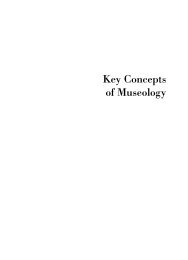ISS 25 (1995).pdf - The International Council of Museums
ISS 25 (1995).pdf - The International Council of Museums
ISS 25 (1995).pdf - The International Council of Museums
Create successful ePaper yourself
Turn your PDF publications into a flip-book with our unique Google optimized e-Paper software.
<strong>The</strong> museum is an universal mechanism to be adapted to different contexts. We. museologists.<br />
operate on two levels: the object context and the museum context. For the museum is also the<br />
testimony <strong>of</strong> an epoch: shouldn't we keep some former museal achievements as samples. acting as<br />
examples to the contrary (colonialism. communism. catholicism and so on) ?<br />
Conclusion<br />
In the relation community-heritage-museum. we can have no model but only some basic<br />
principles. Knowledge is a power. that's true. but one has to acknowledge one's own ability (the<br />
chance <strong>of</strong> gifts. education. training) and the science one has acquired to share it with the community.<br />
In that optic. museums exist to render that sharing easier. <strong>The</strong> ideal motto <strong>of</strong> museologists in their<br />
action could be "know thyself'. which means help the community to become self-governing on its<br />
way towards its culture.<br />
Our power regarding the community is primarily RESPONSIBILITY.<br />
But other questions remains. and one among them: we don't have to cope only with existing<br />
things. We also have to foster creation. So what is our position concerning art and the art-museums<br />
which. at first view. do not seem direcUy community-oriented as ethnography museums?<br />
This will be the theme <strong>of</strong> our next symposium in Rio. in 1996.<br />
124
















